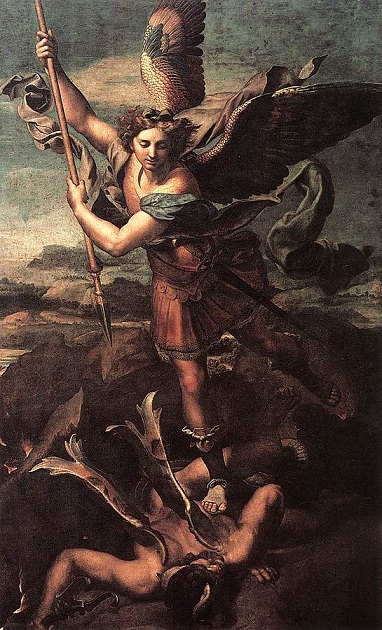This article is part of a series on Old Testament Christophanies. For important background information, see An Introduction to Old Testament Christophanies–with Justin Martyr.

It was a popular opinion from the sixteenth to the nineteenth century that the archangel Michael was the preincarnate Christ. This opinion was held by some of the best-known expositors, including John Calvin,[1] Matthew Henry,[2] and John Gill.[3] Even the Geneva Bible notes that “Michael” is “Christ Jesus the head of angels.”[4] The idea that Michael is a name for the Son of God is derived from Daniel 10:13, 10:21, and 12:1. Now to be fair, you can read these verses in such a way that it makes sense that Michael and Christ are one and the same. However, in none of these verses or the context in which they are found, is there any reason to think that Michael is meant to be understood as Yahweh or God instead of as a created angel. Indeed, the natural reading leads to the conclusion that Michael is the chief created angel, acting in service to God.
The first time the name Michael is used for the archangel is in Daniel 10:13. Michael means “who is like God.” Some understand this to mean that Michael is like God. But the name is meant to be read as a question; thus, “Who is like God?” As impressive and powerful as Michael is, he cannot begin to approach the majesty of Yahweh. According to Daniel 10:13, the angel who spoke to Daniel required Michael’s help to overcome the prince of Persia. This only proves that Michael was more powerful than the other angel. And in the verse, Michael is stated to be “one of the chief princes.” This would mean that Michael is included in the highest order of angels, which is quite different from being God, who is above all angels. Some argue that the phrase is better rendered as “the first of the chief princes.” But even this reading would simply mean that Michael was the highest-ranking created angel.
In Daniel 10:21, the angel told Daniel that no one stood with him in his warfare except for “Michael your prince.” The plain meaning is that the angel had only one other angelic comrade available to fight alongside him. This comrade was Michael, the angel assigned to guard over Daniel and the Jewish people. In Daniel 12:1, we read that at the time of the end, Michael, the great prince who stands guard over Daniel’s people, will arise in defense of the nation. It is correct to say that Jesus Christ or the Son of God is the ultimate champion of Israel. But that doesn’t mean that He is the only defender of the nation. There are legions of created angels at the Lord’s command, and chief among them is Michael. Israel has a guardian archangel.
Michael is mentioned in two more verses, both of which are found in the New Testament. First, there is Jude 1:9:
But Michael the archangel, when he disputed with the devil and argued about the body of Moses, did not dare pronounce against him a railing judgment, but said, “The Lord rebuke you!”[5]
This is the only place where Michael is called the archangel, and Michael is the only named archangel in the Bible. Being the archangel means that Michael is one of the chief angels or that he is the chief angel. The term archangel is used in only one other verse, in 1 Thessalonians 4:16, where Christ is differentiated from “the archangel.” Michael’s dispute with the devil seems to be based on Deuteronomy 34:6, where it is written that Yahweh buried the body of Moses in a valley in the land of Moab, and that no man knew where the grave was. The Lord did this so that Moses’ grave wouldn’t become a place of idolatrous worship for the Israelites. If the dispute is in fact directly related to Yahweh burying the body of Moses, then we may infer that the devil wanted to make it known where Moses’ body was located, but Michael stopped him. Regardless of the exact nature of the dispute, Jude 1:9 presents Michael and Satan as counterparts on different sides in an angelic conflict. Satan is a created angel, and only another created angel could be his counterpart. According to 2 Peter 2:11, unfallen angels don’t bring judgments against fallen angels in the Lord’s presence. Michael not daring to pronounce a judgment against Satan suggests that he is included among the Lord’s unfallen, created angels.
The second time Michael is mentioned in the New Testament is in Revelation 12:7, where it is confirmed that he will have an important role to play at the time of the end. There will be a war in heaven, where Michael will lead an army of angels in battle against the dragon (Satan) and his angels. In Revelation 12:8–9, Satan and his angels are defeated and thrown down to earth. As leaders of their respective angelic armies, Michael and Satan are again portrayed as counterparts. This makes sense if they are both powerful created angels, one unfallen and the other fallen. Satan certainly isn’t the counterpart of the eternal Son of God.
[1] E.g., Calvin, The Book of the Prophet Daniel, vol. 2, Dan 10:13.
[2] E.g., Henry, Concise Commentary, Dan 12:1–4.
[3] E.g., Gill, Exposition, Dan 10:13.
[4] Study note on Daniel 10:13, in The Geneva Bible.
[5] This verse might refer to an account in the Assumption of Moses, an apocryphal work likely written in the early first century AD. And while this could be the case, the Epistle of Jude is inspired by God, which means that the dispute over the body of Moses is certain truth.

Leave a Reply